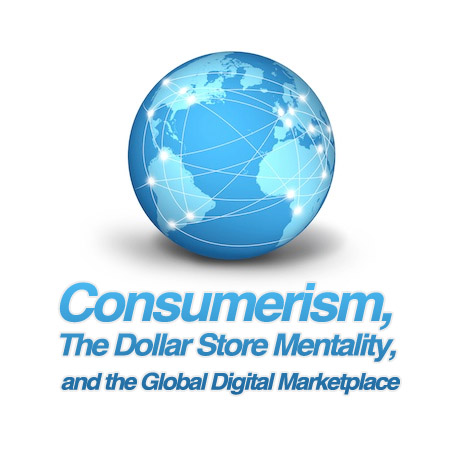Consumerism, The Dollar Store Mentality, and the Global Digital Marketplace

We live under various economic conditions all around the globe, governed by different economic and fiscal policies, that may or may not directly affect the spending habits of the average consumer. However, no matter how the economy is doing wherever you are or how much money you have in your pocket, people will always want to live the good life – a gratifying, enjoyable and comfortable life – regardless. This human need serves as the fuel that drives businesses to market their products to fulfill that desire for the “good life”. The rapid turnover of gadgets and electronic products, and the scarcity or exclusivity of luxury cars, houses, holidays, and other luxury items keep consumers on their toes waiting to buy the next new thing. This is characteristic of the Baby Boomer type of consumer. Work hard. Play hard. Consumerism.
However, analysts and marketers foresee a growing trend – a shift. Today’s digital age is seeing the rise of the “millennials” or “digital natives” – (those born in an era of technology and have grown up with computers, the Internet, and constant connectedness) who use digital wallets and technology-enabled payment tools – who spend their money shopping in app stores, who buy a single music track instead of a whole album, who download software, games, ebooks, other digital media products, aside from the usual physical products.
These modern day, tech enabled consumers rely on technology to research products, discounts, deals, coupons, customer reviews, product information, and other related info on their smartphones or handheld devices. Millennials enjoy the thrill of discovery, the joy of a bargain, the pleasure of sharing, and the power to influence the purchasing decisions of others. Which brings us to say that, one of the major influences to their spending decisions is also the general consensus or sentiments of their social network connections. This shopping behaviour means that today’s consumer goes through more processes before clicking that “confirm purchase” button. What does this mean and how does this impact your business?
This means that businesses should work towards removing perceived barriers and obstacles their consumers encounter. People love to buy but the first thing on their mind is “How much?” It is the first barrier to them making that purchase. One business strategy to lowering if not totally eliminating that first barrier is by employing the “Dollar Store Mentality” to your product pricing. What does this mean?
When people believe that things are a dollar or less, they should be bought in bulk because they are so cheap.
When you lower the consumer’s perceived risk in making a purchase, the easier you make it for them to buy – no matter where they are in the world or what demographic they belong to. This is not to say that everything should be priced at a dollar literally. A product or service that is low cost (relative to similar products in the market) or especially if free will surely attract people like bees to honey. Although this might mean taking advantage of the consumer’s emotional and impulse buying predisposition, this strategy also means that you are opening up a safe entry point for you to introduce your product and for people to try them out with minimal risk. Because the pricing is friendly, the purchasing process becomes easy, fun and addicting, and eventually habit forming. If the product is good, the people will stay, share, and even influence others to patronize your business. Yes, they will talk about you. These habitual customers now become the bedrock for you to start establishing your customer base. As you continue to build trust and confidence in your product and in your business, you can slowly and steadily build customer relationships. Once these relationships are built and established, these customers become more receptive and when you introduce offers for additional products or services at a premium price they don’t pull back because they feel connected to you. The ultimate goal is not just to make a quick sale but to establish a long-term relationship with your customers which is mutually beneficial to both of you in the long run.
Note: Many of the articles on this site include affiliate links that may earn us a commission if you decide to buy the recommended product.




